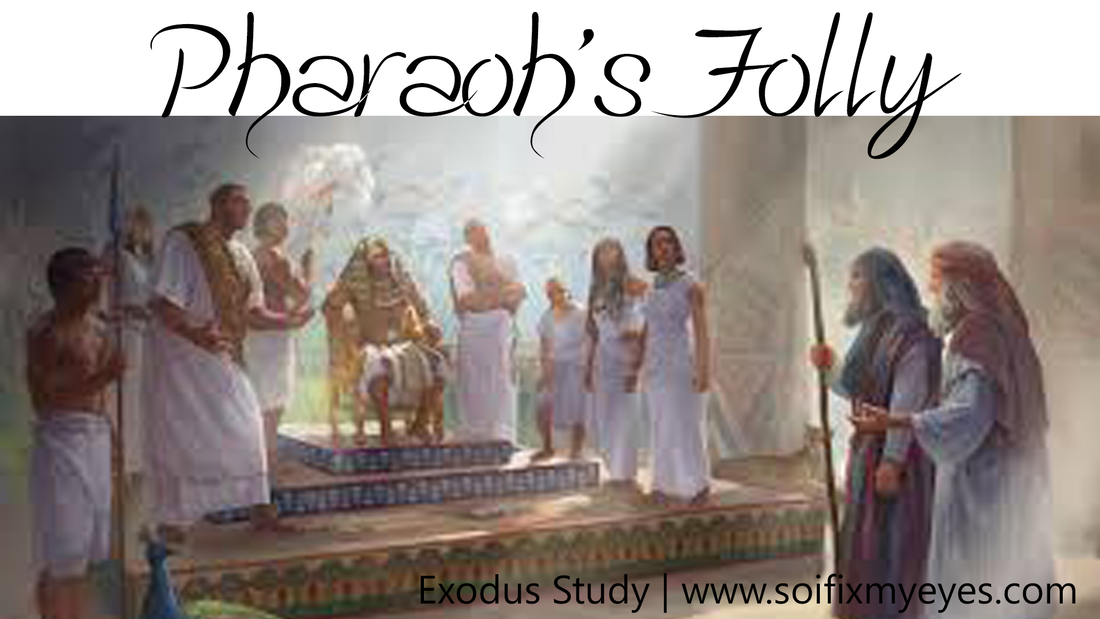Pharaoh's Folly6/1/2019 Pharaoh was the most powerful ruler in the world during the days of Moses. His kingdom was vast and Egypt was at the height of its glory. And while the Pharaoh reigning during the time of Moses’ return to Egypt didn’t have the same paranoia about the Israelites as the previous one, he did recognize the usefulness of free labor and continued oppressing the Hebrews and enslaving them in hard manual labor. Therefore, when Moses returned to Egypt and gave the message that God wanted Israel to go worship in the wilderness, Pharaoh wasn’t too keen on the idea and wanted the Israelites to stay right where they were working on his building projects. His arrogant and mocking reply to Moses and Aaron, while true, ultimately became his folly and caused both himself and the entire nation of Egypt much pain and heartbreak. “Afterward Moses and Aaron went and said to Pharaoh, ‘Thus says the LORD, the God of Israel, “Let my people go, that they may hold a feast to me in the wilderness.”’ But Pharaoh said, ‘Who is the LORD, that I should obey his voice and let Israel go? I do not know the LORD, and moreover, I will not let Israel go.’” ~Exodus 5:1-2 It is logical that the request from Moses and Aaron would seem a bit absurd to Pharaoh. The God of the Hebrews had not been brought up for 400 years. And none of the Israelites had ever mentioned a desire to go into the wilderness. So from a logical point of view, Pharaoh’s answer of “no” would make sense. And it is also true and logical that he did not know the LORD.
However, what comes through in Pharaoh’s answer is arrogance and indifference to God that is not tolerated by the Almighty. There is a hint of mockery in his answer and a “why should I care” posture. God cannot be mocked and will not tolerate the arrogant indifference of man. He will show His glory and reveal His power in ways that will silence those who dare to mock Him. At the beginning of the Exodus, Pharaoh showed little concern for the God of the Hebrews, but after the ten plagues his attitude changed. However, because of his pride and arrogance his whole nation and people suffered. He wasn’t the only one to lose cattle and suffer boils. He wasn’t the only father who lost his son. No, all Egypt suffered because of the folly of their ruler. Likewise, we must realize that our rejection and sin before God not only affects us, but it also affects others. We are not the only ones who suffer for our folly. Our family and those around us will also feel the consequences. Now God told Moses ahead of time that He would harden Pharaoh’s heart against the message of God. Why? So that the LORD might reveal His power to His children and to the world. God was constantly in control. The stubbornness of Pharaoh was all part of God’s plan. However, let’s just make sure that we’re not the Pharaohs of our lifetime. Let’s be on the good team and be the Moses and Aaron of our day who deliver God’s messages and conduct His miracles. A final take-away we glean from the folly of Pharaoh is that we should not be surprised when unbelieves reject the existence of God and His commands. It is true that they do not know the Lord and therefore hold no value for His Word. So let’s not be shocked when our congress seeks to eliminate God from all areas of public life or when evil begin to be voted as good in an unbelieving government. It has happened with world leaders before, and it will happen again. However, as in the case of Pharaoh, God will ultimately reveal Himself in powerful ways so that all the world will know that He is God. So let’s take heart and know that we’re on the winning side.
0 Comments
Your comment will be posted after it is approved.
Leave a Reply. |
Kristin RenferView the About page for more info on the author. Receive Posts via EmailArchives
August 2020
Categories
All
�
|


 RSS Feed
RSS Feed